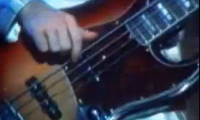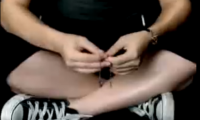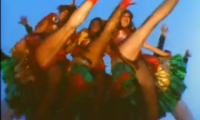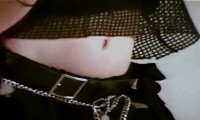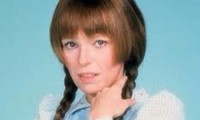Unlike the 70s and 80s, if you asked someone what the quintessential song of the 1960 was and they said something like “Blowin’ in the Wind,” you’d have a hard time arguing with them. You could quibble and say it was “The Times They Are a Changin’,” but you’d have to mount a pretty impressive campaign get most people off that protest, folk song track, even though Motown and British Invasion were going strong during the decade as well.
The 90s are the same, and though the decade is bogged down in a little less aspic than the 60s, there’s not much point in arguing that the quintessential song at least comes from that hybrid of heavy metal, punk, goth and pop developed in the Pacific Northwest, and that, from among the roughly 1989-1993 flood of creepy angry grief that came at us, “Smells Like Teen Spirit” is the quintessence of grunge.
Nirvana, “Smells Like Teen Spirit,” (1991)
Grunge was meant for a very specific group of people: disaffected, superior, the sort of educated 20-year-old who thinks his parents are clueless, corporations are evil, and jocks suck because of all their consumerism and stuff. And it would have stayed that way, moving from small club to small club as Greenriver and Soundgarden and The Melvins affirmed their demographic’s temporary sense of themselves.
But then, as always happens with genres that click, and never happens with those that don’t, there came a long a band that not only embodied the ethos, but catered, consciously or un, to a much broader market, in this case with an attractive lead with far too much respect for musicianship and a better way around standard song structure than their peers.
This song, and the album it fronted, was arguably the last major musical phenomenon to be fuelled by its video. You remember it, set in a high school gym, the band of outsiders performing for an appreciative crowd of jocks who were belaying their disdain for Kurt and friends until the music stopped, while Kurt and friends abused them in song without their knowing or, more likely, caring. Mutual contempt you could dance to. Perfect. You could even ride the fence, sympathize with the decreasingly underdogged musicians without fully buying into their utter disdain, and still buy the album. Which everyone did, knocking Michael Jackson’s “Dangerous,” and the 80s, off the charts.
Kurt himself embodied the middle ground of this contempt, hating the stupid audiences who didn’t get he was making fun of them, and hating himself for whatever it was he was doing wrong in trying to be alternative and ending up at the front of the mainstream. It’s not ground anyone can hold for long.
Most give in and accept the success, and then end up chasing it when the inevitable wane comes. Kurt didn’t, sealing his band’s short arc, and this song in particular, in the same sort of hyperbaric chamber of purity that’s made Janis Joplin into a retroactive R&B genius, and Jimi Hendrix into an unassailable guitar god.
“Smells Like Teen Spirit” made 90s the alt decade. It gave people like David Geffen, and the folks at A&M and elsewhere the idea that weird anti-commercial stuff might sell. It gave record-buyers the same idea.
Nirvana, “Live At The Reading Festival” (1992)
Of course, you can’t be alt and mainstream at the same time, no matter how hard Urban Outfitters might try, and the rest of the decade was spent chasing Kurt’s ghost, alt bands trying to reproduce the suceess, and pop bands trying to score a little alt cred.
The only ones who managed to get a real bite in were the rappers who despite their different aims, techniques and worldview, were Kurt’s only true beneficiaries.
When everyone else realized the magic wasn’t coming back, alt imploded into the most prolonged and unabashedly commercial music scene the industry had ever seen, just before it imploded itself into the singularity of the download.
– Bert Archer
